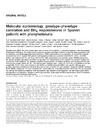Identificador persistente para citar o vincular este elemento:
https://accedacris.ulpgc.es/jspui/handle/10553/49348
| Título: | Molecular epidemiology, genotype-phenotype correlation and BH 4 responsiveness in Spanish patients with phenylketonuria | Autores/as: | Aldámiz-Echevarría, Luis Llarena, Marta Bueno, María A. Dalmau, Jaime Vitoria, Isidro Fernández-Marmiesse, Ana Andrade, Fernando Blasco, Javier Alcalde, Carlos Gil, David García, María C. González-Lamuño, Domingo Ruiz, Mónica Ruiz, María A. Peña-Quintana, Luis González, David Sánchez-Valverde, Felix Desviat, Lourdes R. Pérez, Belen Couce, María L. |
Clasificación UNESCO: | 32 Ciencias médicas 320102 Genética clínica |
Palabras clave: | Diagnosis Genotype Metabolic disorders |
Fecha de publicación: | 2016 | Publicación seriada: | Journal of Human Genetics | Resumen: | Phenylketonuria (PKU), the most common inborn error of amino acid metabolism, is caused by mutations in the phenylalanine-4-hydroxylase (PAH) gene. This study aimed to assess the genotype–phenotype correlation in the PKU Spanish population and the usefulness in establishing genotype-based predictions of BH4 responsiveness in our population. It involved the molecular characterization of 411 Spanish PKU patients: mild hyperphenylalaninemia non-treated (mild HPA-NT) (34%), mild HPA (8.8%), mild-moderate (20.7%) and classic (36.5%) PKU. BH4 responsiveness was evaluated using a 6R-BH4 loading test. We assessed genotype–phenotype associations and genotype–BH4 responsiveness in our population according to literature and classification of the mutations. The mutational spectrum analysis showed 116 distinct mutations, most missense (70.7%) and located in the catalytic domain (62.9%). The most prevalent mutations were c.1066-11G>A (9.7%), p.Val388Met (6.6%) and p.Arg261Gln (6.3%). Three novel mutations (c.61-13del9, p.Ile283Val and p.Gly148Val) were reported. Although good genotype–phenotype correlation was observed, there was no exact correlation for some genotypes. Among the patients monitored for the 6R-BH4 loading test: 102 were responders (87, carried either one or two BH4-responsive alleles) and 194 non-responders (50, had two non-responsive mutations). More discrepancies were observed in non-responders. Our data reveal a great genetic heterogeneity in our population. Genotype is quite a good predictor of phenotype and BH4 responsiveness, which is relevant for patient management, treatment and follow-up. | URI: | https://accedacris.ulpgc.es/handle/10553/49348 | ISSN: | 1434-5161 | DOI: | 10.1038/jhg.2016.38 | Fuente: | Journal of Human Genetics[ISSN 1434-5161],v. 61(8), p. 731-744 (Abril 2016) |
| Colección: | Artículos |
Citas SCOPUSTM
25
actualizado el 08-jun-2025
Citas de WEB OF SCIENCETM
Citations
28
actualizado el 08-feb-2026
Visitas
227
actualizado el 16-ene-2026
Descargas
309
actualizado el 16-ene-2026
Google ScholarTM
Verifica
Altmetric
Comparte
Exporta metadatos
Los elementos en ULPGC accedaCRIS están protegidos por derechos de autor con todos los derechos reservados, a menos que se indique lo contrario.
